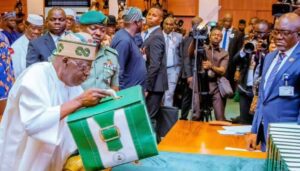
Pools, Betting, Lotteries are residual matters exclusively for states — Body of Attorneys-General of the Federation
…Vows to join Lagos State as Co-Plaintiff in Supreme Court
…Says matters outside National Assembly Legislative competence
By Idris Bakare
The Body of Attorneys-General of the States of the Federation (BOAGS) has called on the Federal Government to allow states to regulate pools, betting and lotteries as matters exclusively for states. The body in a communique at a recent meeting in Asaba, Delta State said that matters relating to pools, betting and lotteries are matters outside National Assembly Legislative Competence.
This was part of a communique issued and signed on behalf of members by the Chairman of the Body, Mr. Moyosore Onigbanjo (SAN), Attorney-General and Commissioner for Justice, Lagos State, as well as the Secretary, Dr. Abdulkarim Kana, Attorney-General, Nasarawa State, from its second meeting held in Asaba, Delta State between the 30th November and 2nd December 2022.
The communique noted the absence of pools, betting, lotteries, gaming, and casinos in the exclusive and concurrent legislative lists, noting that the items are residual matters reserved exclusively for the States, outside the National Assembly’s legislative competence.
Consequently, the body agreed to join the Government of Lagos State as co-plaintiffs in Suit No. SC.1/2008 before the Supreme Court of Nigeria on the matter, just as it commended the National Assembly for the recent round of proposed constitutional amendments, many of which devolve powers from the Federal Government to the States. It averred that the devolution will ensure that decisions are made closer to the local people, communities and businesses they affect.
The body expressed displeasure over the Federal Government’s incorrect distribution of funds derived from the Electronic Money Transfer Levy (EMT Levy) to the Federal, State and Local Governments.
According to BOAGs, it is in disregard of constitutional and statutory provisions, stating that neither section 163 of the 1999 Constitution nor Section 89A of the Stamp Duties Act (SDA – introduced through Section 48 of the Finance Act 2020) allows the disbursement of the EMT Levy to the Local Governments.
According to the communique, SDA provides a sharing formula for the revenue derived from the EMT levy, with 15 per cent of the revenue allocated to the Federal Government and Federal Capital Territory and the remaining 85 per cent allocated to the State Governments. Therefore, the body insisted that each Federating State must receive 85 per cent of the levy derived from that State as the law provides.
It reads, “While we commend the financial sustenance of Local Governments, we counsel against the disregard of constitutional and statutory provisions. Neither section 163 of the 1999 Constitution nor section 89A of the Stamp Duties Act (SDA – introduced through section 48 of the Finance Act 2020) countenance the disbursement of the EMT Levy to the Local Governments.”
The Body thereby called on all State Attorneys-General that have not done so to advise their Houses of Assembly on each proposed amendment’s relative merits or demerits to facilitate informed decisions by the State Legislatures.
Part of the communique also noted that at its inaugural meeting held in Lagos between 15th to 17th June 2022, body had called on the Federal Government to cease any deductions from the States regarding the purported N418 Billion London/Paris Club Loan consultancy fee pending the final resolution of an appeal filed on behalf of the States.
It also expressed displeasure and unequivocally condemned the Federal Government’s issuance of promissory notes despite the subsistence of an Appeal on the matter, reiterating the need for the Federal Government to respect the judicial process and immediately cease any further deductions to avoid imposing a fait accompli on the Court.
Also, the body restated its commitment to taking immediate steps to ensure that the Administration of Civil Justice Laws and procedures are strengthened, made more efficient or otherwise reformed to ensure speedy dispensation of justice and resolution of disputes, thus boosting the confidence of citizens in the justice delivery system.
Regarding the payment of pensions and gratuity for retired State Judges, the body reaffirmed that the responsibility falls on the National Judicial Council under sections 80, 81(3)(c), 84(1), (2), (4) and (7); 2nd Schedule, Part 1, Item 44; 3rd Schedule, Part 1, Paragraph 21(e); and 3rd Schedule Part 2, Paragraph C of the 1999 Constitution. As such, pointed out the need for the provisions to be fully obeyed and implemented.
While reiterating its position regarding the Constitutional powers of the Federating States to establish Anti-Corruption bodies, the body commended the efforts by some States to establish State Anti-Corruption Commissions, urging other States in the Federation to follow suit.
The body declared that crimes committed within a State’s territory must be investigated and prosecuted in that State, condemning the transfer of criminal investigations from State Commands to the Force Headquarters for collateral and/or obstructive purposes.
Furthermore, the body reasserted its advice that all States should deploy appropriate technology in court proceedings, just as it restated its commitment to knowledge-sharing and inter-state cooperation in establishing best practices in administering justice.
The body also resolved to ensure the formal registration of BOAGS at the Corporate Affairs Commission; Establish, staff and equip a permanent secretariat for BOAGS; Ensure the financial sustenance of BOAGS through the regular payment of annual dues and enhance collegiality between and among State Attorneys-General.



